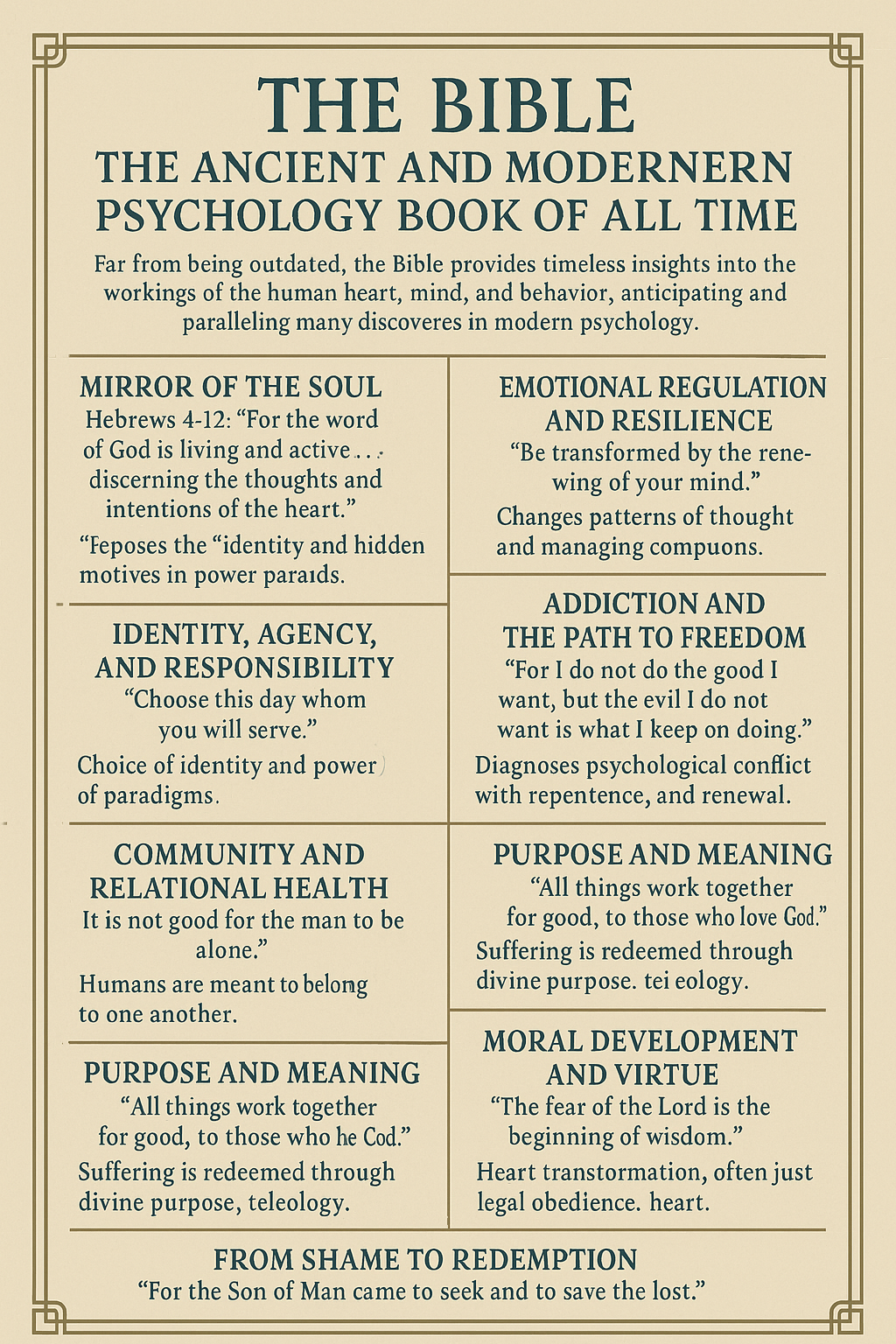The Bible: The Ancient and Modern Psychology Book of All Time
For millennia, the Bible has been revered as a spiritual, moral, and historical text. Yet beneath its theological layers lies a profound psychological blueprint—one that has anticipated, paralleled, and surpassed many modern discoveries in the field of psychology. Far from being outdated, the Bible provides timeless insights into the workings of the human heart, mind, and behavior, offering principles that span emotional healing, identity formation, relational dynamics, purpose, and transformation.
The Bible as a Mirror of the Soul
Hebrews 4:12 declares, “For the word of God is living and active… discerning the thoughts and intentions of the heart.” This diagnostic power is psychological in nature. Long before Freud’s theory of the unconscious, the Bible exposed the hidden motives beneath human actions. It didn’t merely address behavior—it laid bare the internal drivers of that behavior: pride, fear, guilt, shame, envy, hope, faith, and love.
David’s Psalms, for example, read like a journal of cognitive-emotional processing. He expresses depressive anguish, celebrates joy, confronts fear, wrestles with anger—and always cycles back toward orientation, trust, and transformation.
Identity, Agency, and Responsibility
Modern psychology emphasizes the formation of identity, often tied to self-discovery. Yet the Bible teaches something more potent: identity is a decision rooted in relationship and covenant, not a passive discovery.
- “Choose this day whom you will serve” (Joshua 24:15) reflects agency.
- “You are a new creation” (2 Corinthians 5:17) reveals transformation.
- “As a man thinks in his heart, so is he” (Proverbs 23:7) uncovers the power of internal paradigms.
This parallels the agent paradigm in modern positive psychology: individuals are not victims of circumstance but stewards of meaning, action, and choice. The Bible frames humans as co-creators of their destiny—with God.
Emotional Regulation and Resilience
Cognitive Behavioral Therapy (CBT) rests on the triangle of thoughts, emotions, and behaviors—a pattern the Bible models repeatedly.
- “Be transformed by the renewing of your mind” (Romans 12:2) echoes CBT’s emphasis on changing thought patterns to transform life.
- “Take every thought captive” (2 Corinthians 10:5) reflects metacognition and emotional awareness.
- Jesus’ command “Do not worry about tomorrow” (Matthew 6:34) embodies mindfulness, presence, and acceptance.
The wisdom literature—Proverbs, Ecclesiastes, Job—offers rich lessons in managing anger, grief, stress, envy, and despair, anchoring resilience not in control of outcomes, but in alignment with divine purpose and eternal perspective.
Addiction, Sin, and the Path to Freedom
Romans 7 is a masterclass in psychological conflict: “I do not understand what I do… for I do not do the good I want, but the evil I do not want is what I keep on doing.” This maps directly onto modern understandings of compulsion, addiction, and the divided self.
Yet the Bible doesn’t stop at diagnosis—it provides a cure through repentance, renewal, and grace.
- Step 1 in AA (modeled after biblical confession): admit powerlessness.
- Step 2-3: surrender to a Higher Power.
- Sanctification becomes a lifelong therapeutic journey of healing, transformation, and freedom.
Community, Forgiveness, and Relational Health
Attachment theory and social psychology affirm what the Bible has taught for centuries: humans are wired for connection.
- “It is not good for man to be alone” (Genesis 2:18).
- “Confess your sins to one another and pray for one another, that you may be healed” (James 5:16).
- “Forgive as the Lord forgave you” (Colossians 3:13).
Forgiveness, compassion, mutual accountability, and love are not only moral mandates—they are mental health mandates. Unforgiveness breeds bitterness, anxiety, and emotional isolation. Forgiveness frees both the offended and the offender.
Purpose, Meaning, and Transcendence
The works of Viktor Frankl (Man’s Search for Meaning) affirm that those who find meaning in suffering can endure nearly anything. The Bible is saturated with this insight.
- “All things work together for good to those who love God…” (Romans 8:28).
- “We rejoice in our sufferings, knowing that suffering produces endurance…” (Romans 5:3–4).
- “For I know the plans I have for you…” (Jeremiah 29:11).
In contrast to the nihilism of modern secular psychology, the Bible offers teleology—a belief in divine purpose that gives suffering redemptive value. This brings healing and direction.
Moral Development and Virtue Formation
Lawrence Kohlberg’s stages of moral development mirror biblical discipleship. Scripture guides the soul from:
- Fear of punishment (Stage 1) – “The fear of the Lord is the beginning of wisdom”
- Social conformity (Stage 4) – “Honor your father and mother”
- Principled conscience (Stage 6) – “Love your neighbor as yourself,” “Bless your enemies”
Jesus’ Sermon on the Mount is arguably the highest stage of moral consciousness: not mere legal obedience, but heart transformation that overcomes anger, lust, pride, and hypocrisy.
From Shame to Redemption
Modern trauma therapy emphasizes moving from shame and reactivity to integration and self-worth. The Bible’s language of redemption accomplishes the same goal.
- Adam and Eve’s shame is met with a covering.
- Peter’s betrayal is met with reinstatement.
- The Prodigal Son’s disgrace is met with a feast.
In every case, God’s grace not only restores dignity but transforms identity. It is a sacred form of reparenting, rewiring, and reclaiming.
Conclusion: The Timeless Psychology of Scripture
The Bible is not just spiritual truth—it is psychological truth. Its principles align with what modern psychology only recently discovered and offers a deeper, more holistic understanding of what it means to be human.
It teaches not only how we think, feel, and behave—but who we are, who we were made to become, and how we are healed through love, truth, purpose, and grace.
Indeed, no man is good by chance, as Seneca said. But the Bible shows how, through a relationship with God and surrender to truth, anyone can become good—through process, through trial, and through transformation.
It is the original and eternal psychology manual for the soul.





